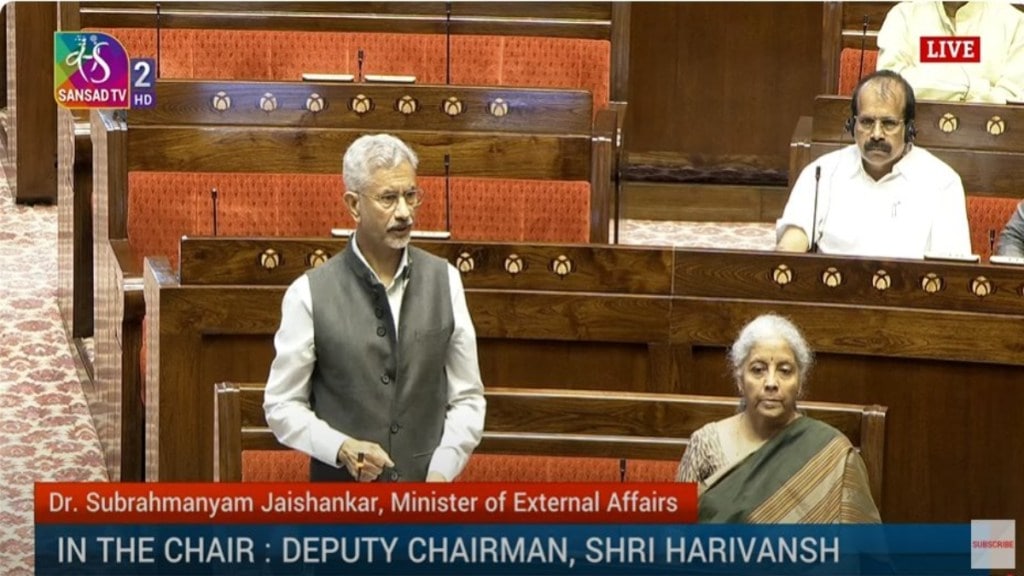As the debate on Operation Sindoor continues in Parliament, External Affairs Minister S Jaishankar and Leader of the House JP Nadda addressed the Rajya Sabha on Wednesday. The operation, launched following the April 22 Pahalgam terror attack, has drawn considerable attention from both Houses, with discussions beginning in the Lok Sabha on Monday and in the Rajya Sabha a day later.
Jaishankar, speaking on the foreign policy dimensions of the operation, said, “Putting the Indus Water Treaty in abeyance was an important step by India. The Indus Water Treaty will be held in abeyance until Pakistan irrevocably gives up its support of terrorism. Blood and water will not flow together. India has faced cross-border terrorism since 1947. Operation Sindoor gave the message that India will not accept nuclear blackmail. It was Pakstan that begged India for a ceasefire.”
“The Indus Water Treaty in many ways is a very unique agreement. I cannot think of any agreement in the world where a country has allowed its major rivers to flow to the next country without having rights on that river. So it was an extraordinary agreement and, it’s important when we have put it in abeyance, to recall the history of this event. Yesterday I heard people, some people are uncomfortable with history. They prefer that historical things be forgotten. Maybe it does not suit them, they only like to recall some things,” he adds.
“The world saw India’s weak response to terror attacks. Congress portrayed Pakistan as a victim of a terror attack. Action in Operation Sindoor was non-escalatory. To people who are questioning the success of Operation Sindoor, I ask them to see the photos of Pakistan airbases destroyed in Operation Sindoor.”
No direct talk between PM Modi and President Trump from April 22 to June 16: Jaishankar
Debunking Trump’s claims of mediating the India-Pakistan ceasefire and the Opposition’s claim of PM Modi agreeing to the ceasefire due to US pressure, Jaishankar says, “…Main unko kehna chahta hoon, woh kaan kholke sun le. April 22 se June 16 tak, ek bhi phone call President Trump aur Prime Minister Modi ke beech mein nahi hua.”
“Let me tell you what has changed in the last decade. We have been able to put terrorism in every global agenda. Today, if terrorism is on the global agenda, it is due to the efforts of the Modi government. We were able to get Masood Azhar and Abdul Rehman Makki, two notorious terrorists placed under the sanctioned of the UN Security Council. Some years ago, we were member of the security council, we were able to hold a security council meeting at the venue of terrorism attack at the Taj Hotel in Mumbai. That even had a huge impact… We were able, through bilateral agreements and understandings, bring back terrorists from key country, who have been sent back to India. I remind you that Tahawwur Hussain Rana, who was wanted for 26/11 Mumbai attack, has finally been brought back to India by the Modi government. It is the effort of the PM Modi government that 26/11 mastermind Tahawwur Rana has been extradited to India. It is due to our diplomatic efforts that today, for the first time, the UN has recognised TRF as responsible for the Pahalgam terror attack in its papers.”
“Several countries were in touch with us post Operation Sindoor. Countries do approach each other in such times. There was no linkage of trade in any of the conversations. No direct talk between PM Modi and President Trump is any of those discussions. On the 10th of May, we got a call from the US and Saudi Arabia,” he adds.
Hitting out at the previous Opposition government, Jaishankar said, “The then PM is saying that let us do this treaty (The Indus Water treaty) because the Indian government should put the interest of the Pakistani Punjab. Not a word about the interest of the farmers of Kashmir, Punjab, Rajasthan, and Himachal… He now says that because people are saying, we felt that in the circumstances, this is the right settlement. We purchased peace and it is good for both countries… 1960, he said that we purchased peace. We didn’t purchase peace, we purchased appeasement because within one year, the same PM accepted that with Pakistan, there is no peace.”
His statement highlights the government’s zero-tolerance policy for cross-border terrorism. The suspension of the treaty signals India’s intent to re-evaluate long-standing bilateral agreements in light of national security concerns. Jaishankar says, “In the last decade, we have been able to put terrorism on the global agenda… Whether it is BRICS, SCO, QUAD or at the bilateral level.”
According to sources cited by PTI, JP Nadda is expected to speak around 3 pm, following Jaishankar’s remarks. Meanwhile, Union Home Minister Amit Shah is likely to deliver the concluding address in Parliament, where he is expected to lay out the government’s broader security strategy and internal response.
The ongoing discussions aim to build consensus around the government’s counter-terrorism efforts and signal strong parliamentary backing for Operation Sindoor.
This is a breaking story. More Information will be added soon…

